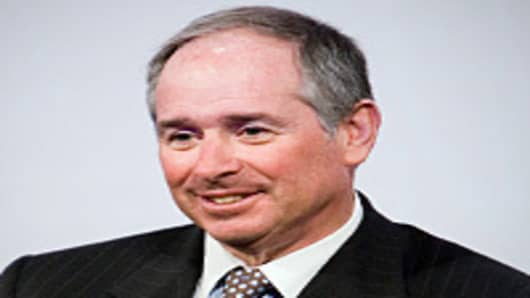The Blackstone Group and the Carlyle Group demonstrated on Thursday that the private equity industry is thriving amid a weak economy — but they did so in nearly opposing ways.
Blackstone, in reporting a 23 percent jump in third-quarter earnings, said it has found the market to buy out companies unappetizing. “There are some good companies being sold, but we just can’t get to the prices that are required,” Hamilton E. James, the company’s president, said Thursday morning.
Carlyle, though, is gobbling up companies. Not long after Mr. James’s bearish comments, Carlyle announced a $2.6 billion deal for Syniverse Technologies, a voice and data services provider for telecommunications companies. On Wednesday, it completed a $3 billion takeover of CommScope, a maker of telecommunications equipment.
The divergent approaches highlight how cheap corporate debt is fueling the recovery of the private equity business. While it remains difficult to get a mortgage to buy a home or to get a loan to fund a small business, yield-starved investors are creating a robust market for corporate bonds and loans.
Private equity firms are seizing upon the corporate-debt boom in myriad ways. For the debt-heavy companies they already own, Blackstone and Carlyle are improving their balance sheets through aggressive refinancing. Corporate loans are now available to do multibillion-dollar buyouts, too, but the easy lending environment has created fierce competition for takeover targets, driving up prices. The corporate loan market “is almost hard to believe,” Mr. James of Blackstone said.
Private equity’s outlook is certainly brighter today than it was one year ago. Buyout firms have made $173 billion worth of deals so far this year, up 95 percent from last year, according to data from Thomson Reuters.
Blackstone, co-founded by Stephen A. Schwarzman, may be reluctant to do deals at the moment, but its earnings report underscored just how favorable the environment has become. The New York-based firm, with $119 billion in assets under management, said its third-quarter profits were bolstered by sharp increases in the value of its real estate holdings.
More than 50 percent of the debt carried by Blackstone companies has either been refinanced at a lower cost or modified with better terms, Mr. James said.
Carlyle, meanwhile, which is based in Washington and whose public face is David M. Rubenstein, is proving that it is unafraid to pay a high price for companies. The buyout firm’s $31-a-share bid for Syniverse is 45 percent higher than the company’s average closing price for the past 30 days. Its $31.50-a-share offer for CommScope, meanwhile, is 39 percent higher than the company’s 30-day average stock price.
Both Carlyle and Blackstone have billions of dollars in investor capital to put to work. Blackstone has invested more than $7.2 billion of investor capital in private equity and real estate deals since the fourth quarter of last year, though it has announced only one major buyout this year: the $4.7 billion takeover of Dynegy, whose purchase price includes the assumption of the energy company’s debt.
Carlyle has invested about $5.8 billion in private equity and real estate this year, more than the $5.2 billion it spent in all of last year. (That figure does not include the Syniverse and CommScope deals.) The firm was behind four of the biggest leveraged buyouts announced this year, including those of Syniverse, CommScope, the vitamin maker NBTY and the Australian hospital operator Healthscope.
Traditionally, Carlyle is not shy about bidding up. In his annual e-mail to employees, William E. Conway Jr., a founder and the firm’s investment chief, hinted that it’s O.K. to pay up for good businesses.
“Of course higher quality assets are never cheap and may initially model at a lower expected” return, he wrote in the message, which was sent in February. “I believe the actual returns will exceed the model returns on these high-quality transactions. The decision to do the deal (or not) will always trump the impact of the final price negotiation. If you do great deals you will get great results.”
Historically, Blackstone has been more averse to pay a premium for its deals, though it did on the buyouts of Equity Office Properties Trust and Hilton Hotels during the equity bubble of 2006 and 2007.
Other buyout firms are also showing some hesitance about jumping headlong into expensive deals. Kohlberg Kravis Roberts is now leaning against making a bid for Seagate Technology, the hard drive maker, alongside TPG, according to a person briefed on the matter.
While they may differ on current buyout opportunities, Blackstone and Carlyle share several investments that they are preparing to take public, including the media company Nielsen. The two firms also joined forces in April 2009 to buy BankUnited, an ailing Florida lender. Eighteen months later, the bank’s results have now stabilized and the firms are prepping an initial public offering to raise $500 million that the bank will use to expand into New York and other locations.
Still, the firms are suffering the effects of having gotten caught up in last decade’s leveraged buyout binge. Blackstone and Carlyle teamed up with two other firms to buy Freescale Semiconductor for $17.6 billion in 2006. Soon after, the chip market collapsed and the deal was widely denounced.
Now, even Freescale is showing signs of life. The value of the investment remains under water, with the firms having it marked down by about 65 percent, according to people with direct knowledge of their valuations. But amid a sharp turnaround in the semiconductor market, Freescale results.


